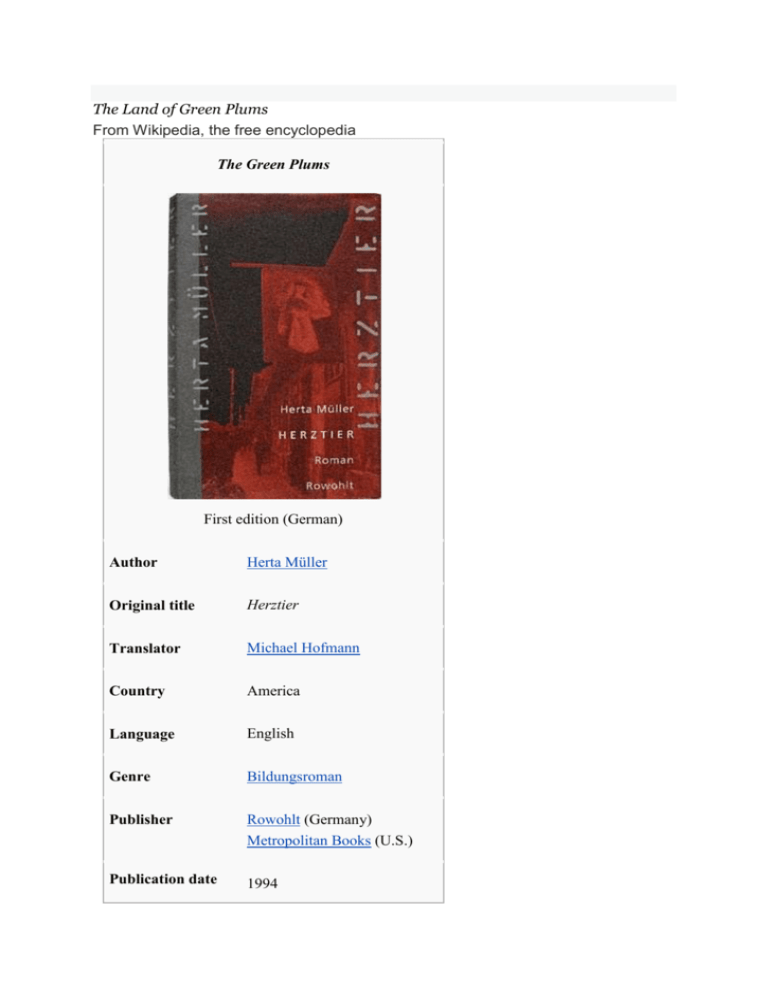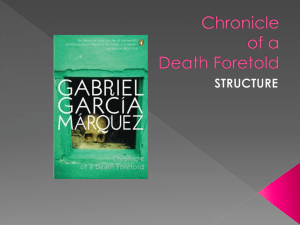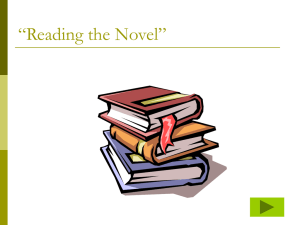The Land of Green Plums Summary
advertisement

The Land of Green Plums From Wikipedia, the free encyclopedia The Green Plums First edition (German) Author Herta Müller Original title Herztier Translator Michael Hofmann Country America Language English Genre Bildungsroman Publisher Rowohlt (Germany) Metropolitan Books (U.S.) Publication date 1994 Published in English 15 November 1996 Media type Print (Hardback andPaperback) Pages 256 The Land of Green Plums (German: Herztier) is a novel by Herta Müller, published in 1994 by Rowohlt Verlag. Perhaps Müller's best-known work,[1] the story portrays four young people living in a totalitarian police state under the Sovietimposed communist dictatorship in Romania, ending with their emigration to Germany. The narrator is an unidentified young woman belonging to the ethnic German minority. Müller said the novel was written "in memory of my Romanian friends who were killed under the Ceauşescu regime".[2] Like many of Müller's books, The Land of Green Plums illustrates the position of dissidents from the German minority in Romania, who suffered a double oppression under the regime of Nicolae Ceauşescu. The rural German-speaking community tries to preserve its culture by enforcing traditional rules; once the main characters escape this environment through university study in the city, they suffer, as political dissidents, the oppression exercised by the totalitarian regime. Those who flee the country for Germany become cultural outcasts: they are not considered German there but rather Eastern Europeans. Critics read the novel as testifying to abuse and the ensuing trauma. Normal human relationships are rendered impossible by the lack of freedom of expression; the threat of violence, imprisonment, and execution; and the possibility that any personal friend may be a traitor. Written in a paratactic style, full of flashbacks and time shifts, the language of the book reflects trauma and political oppression. After its publication in German and its translation into Dutch, the novel received moderate attention. It gained an international audience when the English translation byMichael Hofmann was published in 1996. In 1998 this translation won the International IMPAC Dublin Literary Award, the largest prize given for a single work of fiction published in English.[3] Following the announcement that Müller was awarded the 2009 Nobel Prize in Literature, The Land of Green Plums entered the bestseller list onAmazon.com.[4] PLOT: The first character introduced to the reader is a girl named Lola, who shares a college dormitory room with five other girls, including the narrator. Lola records her experiences in a diary, relating her efforts to escape from the totalitarian world of school and society. She rides the buses at night and having brutish, anonymous sex with men returning home from factory work. She also has an affair with the gym teacher, and soon joins the Communist Party. This first part of the book ends when Lola is found dead, hanging in the closet; she has left her diary in the narrator's suitcase. Having supposedly committed suicide and thus betrayed her country and her party, Lola is publicly denounced in a school ceremony. Soon after, the narrator shares Lola's diary with three male friends, Edgar, Georg, and Kurt; Lola's life becomes an escape for them as they attend college and engage in mildly subversive activities— "harbouring unsuitable German books, humming scraps of banned songs, writing to one another in crude code, taking photographs of the blacked-out buses which carry prisoners between the prison and the construction sites."[5] The four are from German-speaking communities; all receive mail from their mothers complaining about their various illnesses and how their children's subversiveness is causing them trouble; all have fathers who had been members of the Nazi SS in Romania during World War II. They hide the diary and other documents, including photographs and books,[5] in the well of a deserted summerhouse in town. Very quickly it becomes clear that an officer of the Securitate, Captain Pjele, is interested in the four; he begins to subject them to regular interrogations. Their possessions are searched, their mail opened, and they are threatened by the captain and his dog. After graduation the four go their separate ways, but they remain in contact through letters and regular visits, although their letters are read by the Securitate. They take menial jobs: Kurt works in a slaughterhouse as a supervisor, for instance; and the narrator translates German manuals in a factory. A fifth member, Tereza, befriends the narrator even as it becomes clear that she is acting partly on Pjele's orders. The lives of all five become more miserable, and each conforms to the regime's demands even as they lose their jobs for apparently political reasons. They discuss fleeing the country, and Georg is the first to do so. Weeks after he arrives in Germany, he commits suicide by jumping out the window of a Frankfurt hotel. The narrator and Edgar likewise acquire passports and go to Germany, but continue to receive death threats after emigrating. Kurt remains in Romania, no longer working; he is later found hanged. The novel ends with the same passage as it began: "When we don't speak, said Edgar, we become unbearable, and when we do, we make fools of ourselves".[5] Characters[edit] The narrator, Edgar, Georg, and Kurt hail from similar backgrounds. All are German Romanian and students at the same university. They all suffer persecution, and oppose the regime.[6] The characters—especially Edgar, Georg, and Kurt—are quite deliberately not developed in great detail, as noted by critics. "Characterization is not the point here. Müller is primarily a poet", and this poetic interest likewise is said to explain the lack of chapter organization and of transitional phrases.[7] Only two of the six main characters who suffer oppression survive at the end of the book: Lola dies by hanging, Georg commits suicide after fleeing to Germany, Kurt is found hanged, and Tereza, the narrator's friend who betrays her to the Securitate, dies of cancer. [8] Genre[edit] Herta Müller, 2007 Autobiography[edit] The novel is partly autobiographical. Like her narrator, Müller comes from the German-speaking minority in Romania, the Banat Swabians, with a father who had been former SS man during World War II. Trained as a teacher, she lost her position after refusing to cooperate with the Securitate. She emigrated to Germany in 1987.[9] In a 1998 interview she mentioned that real persons can be recognized in some of her characters, including one in The Land of Green Plums: "That [recognition of characters] was already the case in my previous book [The Land of the Green Plums]. Because my best girlfriend died young, and because she had betrayed me, and because I had to despise her and could not stop loving her." [10] In an earlier interview with the Danish newspaper Politiken, Mülller went into greater detail about her friend, portrayed as Tereza in this novel: I had a good friend in Romania, who came and visited me in Germany, when I had finally escaped from the country. She was in the service of the Securitate, as it turned out. She had left her passport lying out, and I saw it by chance one morning, when she was out. No ordinary person had such a passport with visas to Greece, to Italy, and Spain. She confessed everything, and shortly after I naturally had to throw her out. This happened in the same period that I was receiving death threats like many others who had fled from Romania, and I kept far away from Romanians I did not know or could not count on. But she was my friend.[8] Allegory[edit] The novel approaches allegory[11] in many of its details, such as the green plums of the title. Mothers warn their children not to eat green, unripe plums, claiming that they are poisonous. Yet the novel regularly depicts police officers gorging themselves on the fruit: "The officers' lack of constraint in engulfing the fruit parallels the remorseless persecution of the human race" under Nicolae Ceauşescu.[12] The green plums also suggest childhood, or regression into childhood: "The narrator watches the Romanian police guards in the streets of the city as they greedily pocket green plums ... 'They reverted to childhood, stealing plums from village trees.' Ms. Muller's vision of a police state manned by plum thieves reads like a kind of fairy tale on the mingled evils of gluttony, stupidity and brutality."[13] Language and style[edit] Critics have recognized Müller's writing as political, "as a form of manifest resistance against totalitarian claims to power," and have studied her "complex and ambiguous imagery."[14] According to Larry Wolff, reviewing the book for The New York Times, the poetic quality of the language is essentially connected to its author's objective: "the author seeks to create a sort of poetry out of the spiritual and material ugliness of life in Communist Romania."[13] Critics have generally shown appreciation for the novel's language, as did Nicholas Lezard, writing in The Guardian: The prose, while simple at the level of the sentence (and we can safely assume that Hofmann's translation is very faithful to the original), is shifty, blurred, to the point where at times we are left unsure as to what exactly is going on – a deliberate flight from causation, quite understandable in a country where everyone (even, we learn, the horses) has been driven mad by fear.[15] Though the novel's language, and Müller's language in general, is praised for its precision--Peter Englund, secretary of the Swedish Academy, noted her "extreme precision with words"[2]—many things are left unsaid. As a reviewer for The Australian noted, the narrator is never named, the words "totalitarian" and "liberty" never appear in the book, and even Ceausescu, usually referred to as the "dictator," is named only twice, first when one of the characters (a Jewish WWII survivor) notes how the greeting "ciao" is also the first syllable of the dictator's name, and again when a comparison is made between Ceausescu, Hitler, and Stalin.[16] Themes[edit] Trauma[edit] Psychological trauma caused by fear permeates the novel: "Fear, isolation, and abandonment characterize the lives of the first-person narrator and her three friends....Müller describes how fear acquires a life of its own; it becomes independent of the subject's will."[6] One critic argues that "Herztier was written in response to the trauma of life under the Ceauşescu dictatorship, when the citizens of Romania lived in constant fear of the secret police or Securitate."[8] As Müller said in an interview, this fear in the novel is autobiographical as well.[10] According to Beverley Driver Eddy, The Land of Green Plums presents trauma as well as its testimony; the narrator gives her own testimony, and relates it to the testimony of her friends' suffering. The first of these is Lola, the friend who supposedly kills herself; her testimony is preserved in her diary, in which she wrote of her animalistic sexual exploits with nameless men and her struggle to cope with the guilt of having joined the Communist Party in an effort to better herself. For the narrator, preserving Lola's notebook (and sharing it with her three friends) becomes of paramount importance, especially since the memory of Lola was erased days after her death by the Party establishment.[8] Additional complexity comes from Lola's testimony being interwoven in the narrator's own—"a testimony within a testimony."[8] In an interview published in 1998,[17]Müller said that "she is concerned with showing that the childhood experiences have been internalised by the narrator, and that the traumas of the frightened, non-conformist child are replicated to the larger traumas of the adult dissident."[8] In the image of the weeds cut down by the narrator's father, an image presented early in the novel, the parallel between the father and the dictator is evidenced: "both 'make cemeteries' without fear of retribution." One symptom of the trauma this causes in its victims is disconnection, the strain of friendship resulting from lack of trust, disrupting normal human relationships for the remainder of the victim's life. Müller's novel portrays this disconnection and the ongoing trauma for survivors, even after the fall of the dictatorship.[8] Other critics have focused on different effects of trauma in the novel and in Müller's work in general. Lyn Marven argues that the Müller's poetics and style, characterized by paratactic as well as syntactic and narrative gaps, illustrates one of the effects of trauma: "Trauma disrupts the structures of memory....Trauma cannot be integrated into narrative memory and exists only as a gap or blank spot; it therefore cannot be articulated, and returns in the form of surprisingly literal flashbacks, hallucinations, or dreams."[18] Marven notes another effect: a "distorted body image" that often gives rise to a "radical metonymy," a fragmentation, surfacing most notably in a scene where Pjele, during an interrogation, lists the narrator's clothes and possessions, to which the narrator responds by listing her own body parts:[18] "1 pr. eyes, 1 pr. ears, 1 nose, 1 pr. lips, 1 neck."[19] Marven notes that Müller's collages, which the critic says are "central to Müller's œuvre," show the same fragmentation, and says that her "increasingly readable" prose, coupled with recent collages moving toward narrative, might suggest that there is "a possibility of overcoming trauma."[18](Grazziella Predoui also noted that Müller's prose is developing from parataxis toward more complicated syntax.[20]) Banat-Swabians[edit] The situation of the Banat-Swabians, the German-speaking minority in Romania, is a recurring theme in Müller's writing. Historically, Germans were recruited by the Austria-Hungary to repopulate southern areas following the expulsion of the Turks of the Ottoman Empire. They were given special privileges, allowed to keep their language and Roman Catholicism, even in areas in which the Orthodox Church was paramount. Their communities spoke German into the 20th century. They were among ethnic Germans, or Volksdeutsche, whom Adolph Hitler proposed to unite in a greater Germany. Millions of ethnic Germans were expelled from eastern Europe after the war; thousands were forced into labor camps. Even years later, they were often discriminated against in Romania under the communist government. By the late 20th century, their status is one of the central themes of The Land of Green Plums; this idea is explored in detail in Valentine Glajar's 1997 article "BanatSwabian, Romanian, and German: Conflicting Identities in Herta Müller's Herztier." The Banat-Swabian community, of which the narrator is a member, was described by Müller as extremely ethnocentric. Following persecution after the war, while remaining survivors had no desire to emigrate to Germany, they exerted an almost totalitarian control, especially on their children to keep them within their community.[6] Müller had already addressed this topic in her first work,Niederungen, translated as Nadirs in English, in which the German community holds on to its language and habits in an attempt to deny the Romanian dictatorship that rules them. One critic characterized this communal attempt in Niederungen as a "mechanistically followed tradition".[21] According to Glajar, this is the world of the narrator's mother, who writes of her sicknesses in her letters in the hope of keeping her daughter emotionally connected to her home village. The narrator's father was a member of the SS (as were Müller's father and uncle), and is a troubling example of Germanness. The novel proposes a tension inside Romania between the culturally totalitarian atmosphere of the BanatSwabian community and the politically totalitarian world of Timişoara, where the main characters attend college—between German and Romanian. But the main characters who move to Germany quickly discover that although they were German in Romania, they are Romanian in Germany. They face new social, cultural and linguistic difficulties. Georg commits suicide a few weeks after his arrival in Frankfurt.[6] The Land of Green Plums Summary The Land of Green Plums, the third novel by Nobel laureate Herta Müller, was first published in Berlin in 1993. The work centers on the German minority in Romania under the regime of Nicolae Ceausescu, a despotic Communist leader. (He was a dictator who repressed his people for twenty-four years and was executed, along with his wife, on Christmas day in 1989.) Lola, the novel's main narrative force, is a poor girl from the provinces who goes to a women’s university in Romania to study Russian. Underscoring the atmosphere of impoverishment, Lola and her roommates fantasize about owning nylon stockings, but make do with what they have by combining their meager resources. Unprepared for her life in the city, Lola has a number of negative sexual experiences. In despair, she hangs herself, and after her death she is expelled from the Communist Party. One of Lola’s roommates, the narrator of the novel, refuses to accept that Lola’s death was a suicide. After she becomes the subject of political suspicion, she leaves the university. The narrator eventually immigrates to Germany to escape the regime and its oppression. The novel is considered to be closely autobiographical as well as allegorical. Müller’s title draws from the repetitive image of unripe “green plums” eaten by the officers working under Ceausescu’s reign. The officers' lack of constraint in consuming the fruit symbolizes greed and exploitation. In addition, the guards drink the warm blood of animals from the slaughterhouses, which conveys the hostile reality of life in Romania at the time. Even the dictator receives blood, like a vampire, to replenish his red blood cells in an attempt to treat leukemia. Critics have noted Müller’s individual style, singular voice, and simple but fearless observations. The Land of Green Plums is celebrated for accurately portraying the oppressive and horrifying experience of living in a police state. The characters are unable to forget—even after they move or escape—the images that the regime represented. Book: The Land of Green Plums Author: Herta Müller Translated: Michael Hofmann Genre: Fiction Publisher: Granta Books Excerpt: “I knew the dwarf lady on Trajan Square. She had more scalp than hair, she was deaf and dumb, and she wore a grass pigtail like the discarded chairs underneath the old people’s mulberry trees. She lived off the rubbish from the greengrocer’s shop. Every year she got pregnant by Lola’s men, who came off the late shift at midnight. It was dark in the square. The dwarf lady couldn’t run away in time, because she couldn’t hear their approach. And she couldn’t scream.” It’s not easy to read or write about books that carry tales of oppression and dictatorship, particularly those based on the East European dictatorships. Such dreadful stories give you goose bumps; leave your eyes wide open and your heart filled with sorrow. The Land of Green Plums by Herta Müller relates a similar tale. The author was born in Romania in 1953. She was a teacher by profession and had to emigrate in 1987, and after refusing to cooperate with Ceausescu’s Securitate, she lost her job and suffered repeated threats. The original book is in German but has been translated into English by Michael Hofmann. It is written in an autobiographical style but despite that, is not an easy book to get into. During the first 40 pages, understanding the story is somewhat difficult, but then it begins to cast its spell. The more you read, the more you want to find out what happens next to the four friends who are the central characters of the book. They are a rebellious lot who have come from impoverished provinces in search of better prospects in the city. The novel casts a spell over the reader and is difficult to put down once you become attached to the characters. Müller’s description of emotions and feelings, while living under monitored and claustrophobic surroundings, are heart throbbing. She uses her powerful imagery to make the reader understand how morose life was during the Communist Romanian dictatorship. The extent of vulnerability that was present under the facade of security is evident in the excerpt above. The author’s expressions convey how fragile relations were during that time of oppression. Everyone had a friend in every wisp of cloud That’s how it is with friends where the world is full of fear Even my mother said, that’s how it is Friends are out of the question Think of more serious things. The narrator appears to be very bold; she is rebellious and survived Lola’s death, her father’s death and Captain Pjele’s demeaning interrogation but couldn’t take being sacked from her job as she refused to join the Communist party. That was the first time she shed tears. All four friends deal with their sadness and sorrow through jokes and poetry and meeting and laughing, besides planning to emigrate or waiting to die. Life under totalitarian rule was difficult, especially if one refused to join the all-powerful Party. The characters showed a great deal of patience, fought hard, but in the end, the only survivors were the narrator and Edgar. All committed suicide but in reality, the blame for their deaths can be laid at the doorstep of the State. The novel ends with Muller’s curse to Captain Pjele. His disgusting interrogation, monitoring and threats haunted her even after emigration. The book opens and ends with “when we don’t speak, said Edgar, we become unbearable, and when we do, we make fools of ourselves.” Despite the heavy subject matter, the novel is not depressing at all; in fact, it encourages life and the ability of humanity to rise beyond the reality of pain and oppression. Published in The Express Tribune, July 9th, 2011. The Land of Green Plums is the story of a group of young people in Nicolae Ceausescu's Romania. Having left their impoverished villages for University in search of education and camaraderie, yet largely unprepared for urban life by their provincial childhoods, the youths quickly find their hopes dashed: the city no less than the countryside bears the mark of the dictator's corrosive touch. Soon the focus of political suspicion, the narrator and her friends feel the impact of an oppressive regime: constant surveillance, harassment, humiliating interrogations, police brutality. Eventually, the friends betray each other and themselves: as they do, we see the way the totalitarian state comes to inhabit every human realm and how everyone, even the strongest, must either bend to the oppressors or resist them and thereby perish. Set in Romania at the height of Ceauescu's reign of terror, The Land of Green Plums tells the story of a group of young people who leave the impoverished province for the city in search of better prospects and camaraderie. But their hopes are ravaged, because the city, no less than the countryside, bears everywhere the mark of the dictatorship's corrosive touch. All the narrator's friends—teachers and students of vaguely dissident allegiance— betray her, do away with themselves, or both. As they do so, we see the way the totalitarian state comes to inhabit every human realm and how everyone, even the strongest, must either bend to the oppressors or resist them and thereby perish. Herta Müller, herself a survivor of Ceausescu's police state, speaks from intimate experience. Scene by scene, in language at once harsh and poetic, she constructs a devastating picture of a society and a generation ruined by fear. In simple images of hieroglyphic power—policeman filling their pockets and mouths with green plums; girls sleeping with abattoir workers for bags of offal; a docile proletariat making things no one wants—"tin sheep and wooden watermelons"—Müller anatomizes a country and its citizens and the corruption that has rotted the core of both. Themes: How true is this opening line? When we don't speak, we become unbearable, and when we do, we make fools of ourselves. Ms. Muller opens and closes her novel, The Land of Green Plums, with this line so she must thinks it's important. It must be the key her novel's theme. What meaning can we find in it? How different is the thought behind it from Mark Twain's comment "Better to keep your mouth closed and appear foolish, than to open it and remove all doubt." Mr. Twain speaks of how others will view us, while Ms. Muller speaks of the price we must pay for choosing to speak or to remain silent. The Land of Green Plums concerns a young woman sent from the Romanian countryside to attend school in the city during the closing years of Nicolae Ceausecu's dictatorship. As the novel follows her life and the lives of her friends, we see how all four are affected by the suicide of one, Lola, who hangs herself after realizing none of the school's authorities or the police will take action against the gym instructor who is sexually abusing her. If we don't speak about things like this, how will that secrecy affect us, asks the opening line. How does the collective weight of all our silences damage us? There is a pop-psychology notion in America that we are only as sick as our secrets. If this is true, then the Romania of Ms. Muller's childhood was one very sick place. Her novel gives the reader a clear sense of the big picture by focusing on the specific smaller ones of her character's experiences. The daily grind of life under Ceausecu, the constant threat of surveillance, the lack of freedom, the lack of opportunity, were all mundane facts of life in Romania for Ms. Muller's characters. After Lola's death, the narrator and her close friends all fall under the suspicion of government agents, though I missed whatever it was they did to be considered anti-government. This may be the point. The interrogations and the surveillance they endure seem pointless because they probably were. They were students who wrote a few poems that some might consider radical. It's difficult to see why any functioning government would consider them a threat. But they are seen as threats, so much so that they all end up applying for passports to leave the country of their birth knowing they will never return. But if they tell their stories, they only seem foolish. The characters themselves do appear a bit foolish by the end of The Land of Green Plums, but it's the government itself that really comes away looking bad--the government and the people of Romania who acquiesced to it for so long. If we read the narrator as a stand-in for Ms. Muller and the novel as a portrait of the artist as a young woman, which I think is a justified reading, then the book is the author's reply to the opening line's question. Better to speak, on some level, than to remain silent, even though Ms. Muller had to flee Romania in order to speak freely. Maybe that is the point Ms. Muller is leading us to--that we must face this push-pull between needing to tell the truth about ourselves and our fear that doing so will make us look bad. Can we face what really happened when doing so means facing our own complicity in a history we'd like to deny whether that history be personal or cultural? By writing The Land of Green Plums, Ms. Muller answers in favor of speaking, though the price be high.









